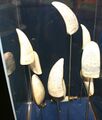Template:Selected anniversaries/April 11: Difference between revisions
No edit summary |
No edit summary |
||
| Line 54: | Line 54: | ||
||1947: Lev Bulat born ... physicist and academic. | ||1947: Lev Bulat born ... physicist and academic. | ||
||1953: Byron Preiss (April 11, 1953 – July 9, 2005)[1] was an American writer, editor, and publisher. He founded and served as president of Byron Preiss Visual Publications, and later of ibooks Inc. Weird Heroes, The Stars My Destination. Pic. | |||
File:Kashmir Princess.jpg|link=Kashmir Princess bombing (nonfiction)|1955: The Air India [[Kashmir Princess bombing (nonfiction)|Kashmir Princess]] is bombed and crashes in a failed assassination attempt on Zhou Enlai. | File:Kashmir Princess.jpg|link=Kashmir Princess bombing (nonfiction)|1955: The Air India [[Kashmir Princess bombing (nonfiction)|Kashmir Princess]] is bombed and crashes in a failed assassination attempt on Zhou Enlai. | ||
Revision as of 15:59, 31 March 2020
1789: Clockmaker Jean-André Lepaute dies. He was an innovator, introducing numerous improvements in clockmaking, especially his pin-wheel escapement, and his clockworks in which the gears are all in the horizontal plane.
1913: Physicist, inventor, and crime-fighter Nikola Tesla uses polyphase alternating current technology to detect and prevent crimes against physical constants.
1914: Mathematician Dorothy Lewis Bernstein born. She will be the first woman to be elected president of the Mathematics Association of America.
1923: Outbreak of Scrimshaw abuse in Seattle and Portland blamed on new class of crimes against mathematical constants.
1955: The Air India Kashmir Princess is bombed and crashes in a failed assassination attempt on Zhou Enlai.
1956: Art critic and alleged supervillain The Eel escapes from The Nacreum, says he has been framed for crimes he did not commit by the enemies of Cornelius Drebbel.
1962: Physicist and academic Ukichiro Nakaya dies. He created the first artificial snowflakes.
1980: Viking program: After operating on the surface of Mars for 1316 days (1281 sols), the Viking 2 lander is turned off when its batteries fail.
2006: The Venus Express spacecraft arrives at Venus after 153 days of journey, and begins continuously sending back science data from its polar orbit around Venus.
2017: Dennis Paulson calls for a moment of silence in recognition of the thirty-seventh anniversary of NASA switching off the Viking 2 spacecraft.









